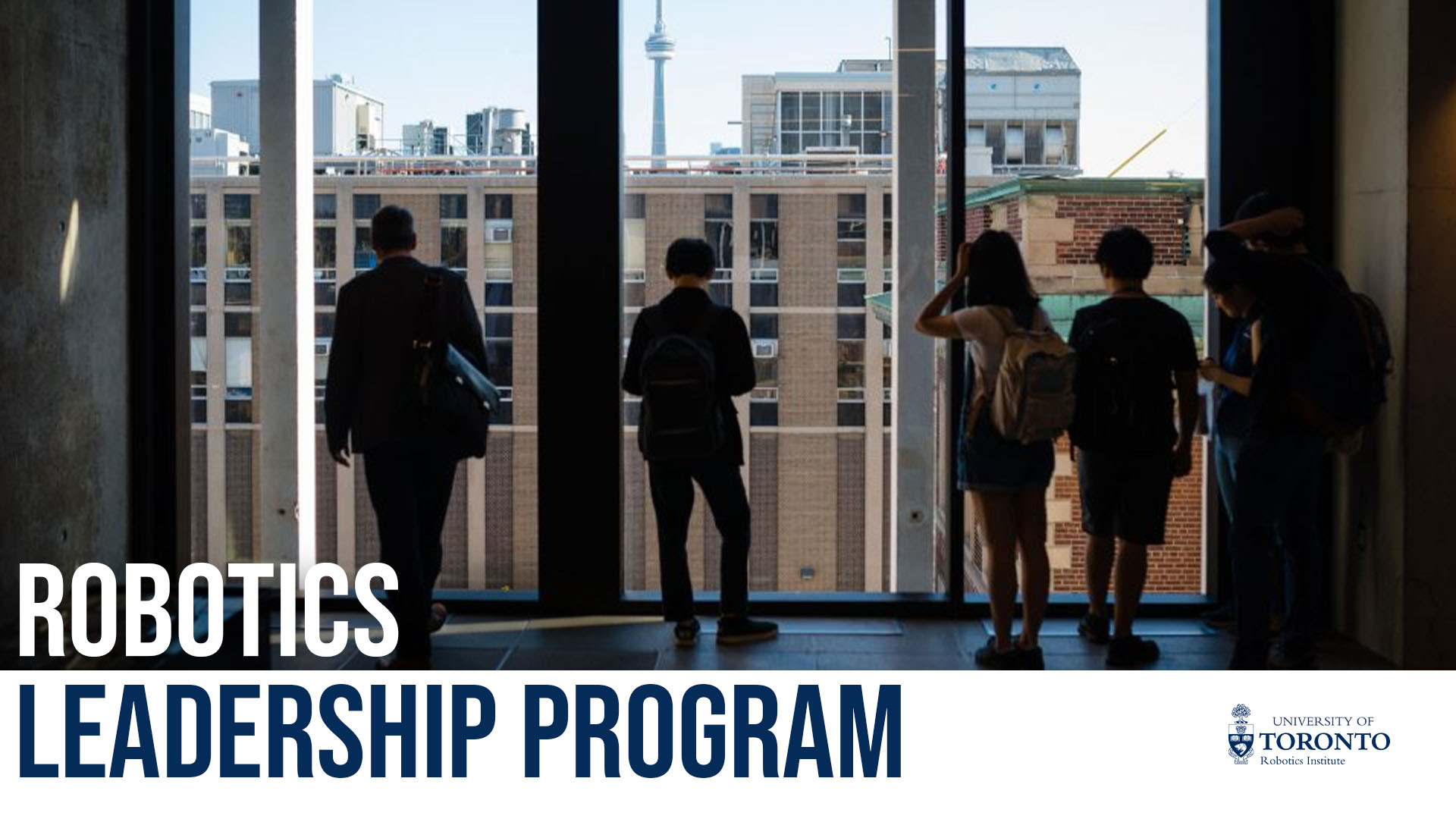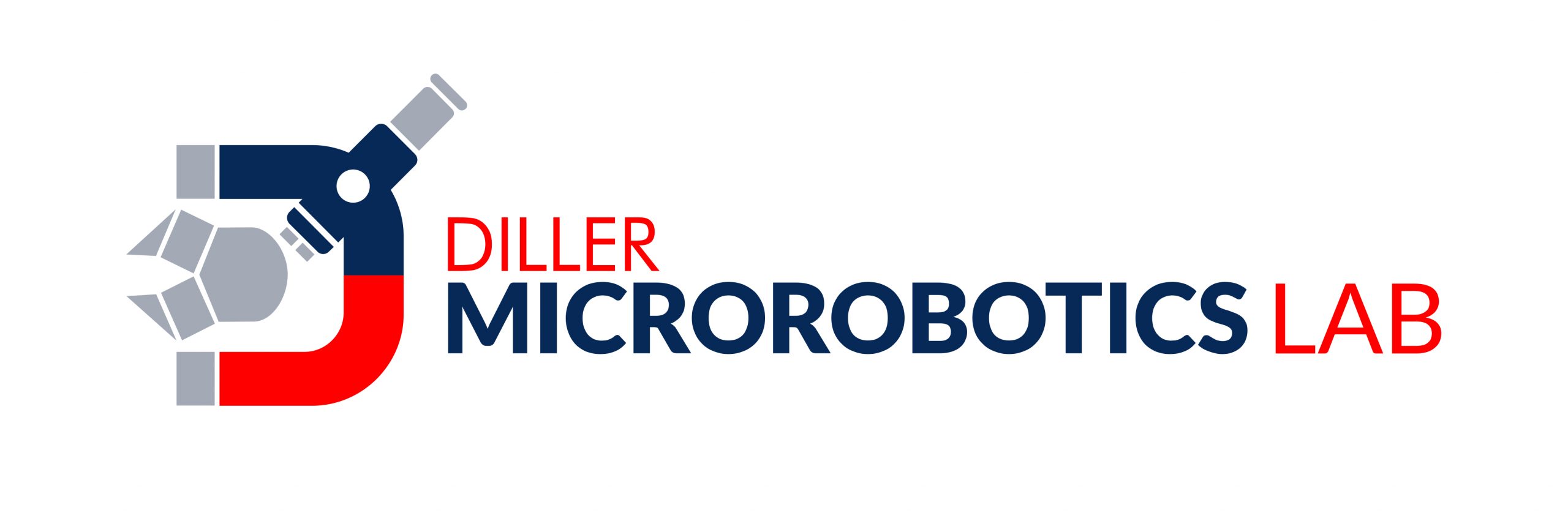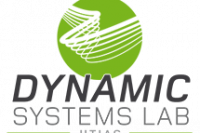
Program Overview
The Robotics Leadership Program (RLP) is an annual co-curricular graduate training program that will mentor and train the next generation of robotics leaders at the University of Toronto Robotics Institute. Inductees will develop skills and experience to be ambassadors for the public understanding of robotics, bridge-builders between technical and non-technical communities, advocates for equity and diversity in robotics and STEM education, and service-leaders in their own robotics communities. The program will develop and scale the outreach and communication capacity of the Robotics Institute as a whole, while providing our graduate students with global competencies and hands on service-learning as they actively engage our local and regional communities in activities and events that demystify robotics.
Workshops and events are programmed in person.
For questions or more information, please contact Eric Diller and the rest of the Outreach Committee at robotics@utoronto.ca.
Outreach Committee: Eric Diller (Chair), Jessica Burgner-Kahrs, Jonathan Kelly, Maria Yablonina, Hallie Siegel
SPONSORED BY

2023-24 cohort - 11 students from 6 labs
Chengnan (Jimmy) Shentu
Chloe Pogue
Daniel Sieben
Daniel (Zi Cong) Guo
Daniil Lisus
Deniz Jafari
Erik Fredin
Hannah Smegal
Mustafa Haiderbhai
Paul Kang






2022-23 inaugural cohort - 11 students from 8 labs
Adam Heins
Connor Holmes
Haleh Shasa
Haley Mayer
Masoud Moghani
Priyanka Rao
Sven Lilge
Xia Wu
Xiaoyun Liu
Yunqi Huang
Zhanfeng Zhou








Program Requirements:
Over the course of a full year (beginning in summer 2023, dates TBA), students must complete a series of workshops, participate in the Fall 3MT (Three Minute Thesis) competition, and work with their assigned mentor to identify and implement an outreach activity that demonstrates their leadership training. At the end of the year, trainees will present their completed leadership activity and outcomes to the next cohort of RLP trainees.
| Estimated Time Commitment | When | Activity |
|---|---|---|
| 2-3 hours | Anytime | Introductory EDI Training Students must demonstrate that they have completed introductory EDI training. While options will be provided through the Leadership program, students may also choose an equivalent option that suits their needs. Past EDI Training sessions can satisfy this requirement. |
| 12 hours | Summer | Summer Workshops 6 workshops, 1-2 hours each, plus prep time as needed |
| 6 hours | Fall | Fall workshops 3 workshops, 1-2 hours each, plus prep time as needed |
| 8-10 hours | Fall | 3MT Competition Participation in the Robotics Institute Three Minute Thesis competition required for trainees, preparation and event time |
| 3 hours | Fall/Winter | Meetings with Mentors One 1-hour small group meeting. Two 1-hour 1:1 meetings |
| 10-15 hours | Winter | Outreach Activity Planning 1 hour per week for 10 weeks, group planning meeting with supervisor, plus additional independent or team work as needed to deliver the project |
| 2-3 days (16-24 hours) | Spring | Deliver Outreach Activity or Event Final preparation and delivery of activity or event Reflection activity / social celebration |
| 4 hours | Summer/Fall | Group Presentation Prepare an informal summary of your experience and present your project and outcomes to the next cohort of trainees and/or to RI (e.g. at next Leadership Summer workshop, or at RI Fall Workshop) |
| ~100 hours | TOTAL |
Program Mentors:
All RLP trainees will be assigned a faculty mentor who will help guide their development in the program, discuss career goals, and serve as a formal touch point for questions and issues. The faculty mentor will also be a resource in developing the annual student-led outreach event. In future years, former RLP graduates will also serve as mentors.
- Mentor-mentee matching: In keeping with current best practices in EDI, every attempt will be made to find synergistic mentee-mentor pairings that are tailored to the student’s individual needs. For example, research suggests female students often benefit from the role modelling of female mentors. Students will be assigned a faculty mentor who is not their primary thesis supervisor.
- Mentorship Meetings: Mentors will meet with students privately or in a small group at least three times throughout the program to discuss career goals and personal development:
- The first introductory mentorship meeting will be a small group meeting between the faculty member and their cohort of mentees.
- The second and third meetings will be 1:1, spread throughout the year.
- Drop-in hours may also be available once per term
RLP Eligibility:
Graduate trainees who meet the following conditions are eligible to apply:
- PhDs and postdocs who are supervised by a Robotics Institute faculty member (preference is given to PhD students)
- Have completed at least one semester of their degree by the nomination deadline (brand new students are not eligible).
- Are not in their final year (applicants should not be planning to defend their thesis before the program end date - for this inaugural year, that is Spring 2023).
Due to the limited cohort size, Masters students will not be eligible in this first pilot year of the program.
RLP Nomination:
Self-nominations will be assessed for leadership potential; applicants need not have experience in outreach or leadership before applying to the program. Applicants must complete a self-nomination form, which will collect the following information:
-
- Year of their degree program, departmental affiliation, primary/secondary supervisor
- A personal definition of robotics leadership in robotics
- An example of when the student has demonstrated robotics leadership in the past OR an example of when they did not demonstrate leadership but wish they had, and what they would do differently.
- Personal strengths and areas for personal improvement
- Commitment to participating in all workshops and events if selected
- Supervisor acknowledgment
Application forms due May 1, 2023
Summer workshop series: Reach Others by Presenting Yourself
Six weekly workshops (1-2 hours each) focused on developing trainees’ ability to present their research to a non-expert audience, and culminating in a prepared presentation to the group. Workshops will be tailored to the needs of the incoming trainees and are subject to change.
Potential Summer Workshops include:
- Robotics Leadership Training Kick-Off Event
- Led by RI Outreach Committee Members, this session will welcome Robotics Leadership trainees to the program and introduce them to faculty mentors and staff. Outreach Committee members will discuss the importance of the leadership program to the Robotics Institute development plans, and give personal examples of outreach and leadership in a robotics context. In small groups, and as a cohort, participants will discuss their aspirations for the program, in terms of both personal and team goals. Social time will be included at the end.
- Improv(e)
- Trainees will practice their communication skills and get comfortable presenting on- and off- screen through fun, low-stakes improvisational games, and reflect on their experience in a personal self-reflection journal
- Communicating Robotics
- As a cohort and in small groups, trainees will examine the latest public perception research related to robotics and AI, analyze how dialogue on robotics manifests in the public sphere and news media, and explore the implications for robotics practitioners, including tips and common pitfalls when communicating robotics research to a general audience and to the media.
- Presenting Robotics
- There is nothing more inspiring than a bold idea delivered by a great speaker. Ideas, effectively packaged and delivered, can change the world. TED is known to share such ideas from the world's best speakers. The goal of this workshop is to learn about how research storytelling humanizes the science, enabling the findings to resonate, and in turn, become memorable to a broad audience.
- Inclusive Robotics
- As robots extend into increasingly sensitive human environments, robotics developers must be accountable for the unintended consequences of the systems they are building, and consider the responsibilities they have to the people who may be impacted by their technology. This includes both technology end-users and those who may have been excluded from the design process. This session will begin with a workshop on equity, diversity and inclusion principles led by UofT’s Director of EDI, followed by a panel discussion with leading robot ethics experts. Panelists will discuss issues of diversity and inclusion as they apply directly to the field of robotics, the role of bias in perpetuating and exacerbating discriminatory behaviour in robotics systems, and review efforts currently underway in the global robotics community to foster accountability and inclusivity in the design of robotics and AI systems.
- Praxis
- Trainees will put what they have learned thus far into practice by workshopping short presentations about their current research. Each trainee will give a three minute talk about their research, designed for an imaginary but undisclosed non-technical audience, for example kindergartners, high school students, policy makers, regulators, venture capitalists, grandmothers, neighbors, press/media). At the end of the presentation, the group will guess which audience the presentation was designed to address, and offer feedback to presenters.
Fall & Winter: Topic-specific workshops
Two or three topic-specific workshops will be offered each year. These workshops will be open to all UofT robotics members, but attendance will be required for Robotics Leadership Program inductees. Workshops will complete by December. Workshops will be determined by the needs of the incoming class.
Potential workshop topics:
- Robotics 3MT Practice Workshop: Students meet to workshop and practice their presentations for the fall Robotics 3MT competition
- Writing about your research for a general audience
- How to talk to the press and news media about robotics
- Scoping your outreach activities for young audiences
- Adult Education and Community Development
- Video production techniques
- Landing your first robotics job, and where to go from there
- Economic impacts of robotics and automation
- Robot Ethics / Ethical robot design
Spring: Trainee-led outreach activity
Using knowledge gained from the workshops, leadership trainees work collectively to engage other Robotics Institute students in an outreach or communications skills development activity of their choice. Example activities might include: creating and delivering a robotics module for one of the many robotics-themed camps already running at UofT (Blueprint, Launch, Engage, and Girls Jr. Deep), organizing a community outreach event involving local elementary or highschool students or seniors, planning an event for prospective students, or producing a podcast or video for the general public. The event must involve the broader public beyond current graduate students or other researchers.
- Trainees may work as one cohort or in smaller groups
- Trainees may recruit assistance from the broader Robotics Institute student membership to deliver their program, but will be responsible for the overall planning, design and delivery of the activity
- A brief proposal including intended audience, roles, timeline, potential partners, and budget must be approved by program mentors prior to engaging with any external groups
- Trainees can be expected to commit ½ to 1 full day per week to the planning and delivery of the outreach activity over the winter/spring period.
- After the activity has been delivered, trainees and mentors will hold a debrief meeting to reflect on the activity and lessons learned (what worked, what could be improved).
- Trainees are expected to prepare and deliver a brief presentation about their outreach activity and lessons learned, to share with their own labs and with the following year’s Leadership cohort.
Certificate:
Students who complete the full program will receive a “Robotics Institute Graduate Leader Certificate”. To receive the certificate at the end of the program, RLP trainees must submit an application dossier containing:
- A list of the workshops they attended. Substitute programming may be considered in the event that a student had to miss a workshop. It is the responsibility of the student to arrange their own substitute and seek approval of their mentor for the substitution.
- Brief description of the outreach/service event they led and why it meets the leadership criteria.
- Next steps/goals: A brief, clearly articulated vision for their long term leadership goals and how they plan to develop their leadership further
- If students wish to self-nominate for the Robotics Leadership Award, a one-page letter detailing why they should be considered for this award.
- Articulate which self-selected introductory EDI training they undertook (does not have to have taken place within the RLP year)
RLP Timeline:
- Monday April 1 2023: Nominations begin
- Friday May 1, 2023: Nomination deadline
- May 2023: Inductees announced
- June-July 2023: Summer Workshops
- First week of August: Praxis (conclusion of Summer Workshop series)
- September-December 2023: Topic Specific Workshops (2-3)
- October/November 2023: 3MT Competition
- January-April 2024: Outreach event planning and delivery
- April 2024: Due date for Certificate Completion Dossiers and Robotics Leadership Award Applications (same deadline)
- June2024: Robotics Leadership Award winner announced at RI event.
$1,000 Robotics Leadership Award
- Awarded in late spring 2024 (or when the fRLP program is nearly ending).
- Applications are open for any RI students/postdocs -- not only to RLP trainees.
- Leadership Program participants may submit a self-nomination when they apply for their Leadership Certificate.
- Evaluation Criteria include documented evidence that the student has made progress in developing themselves as a leader
- Emphasis will be on outreach/service events to the broader community. Service leadership within the research community will also be considered.
- The extent of the leadership role of the student in the event or activity, ie was the student playing an active role in shaping the event?
- Evidence of impact through the number of people reached, the value for the attendees, and who was attending.
- Evidence that the student applied EDI principles and mindset in their leadership
- Up to two awards may be given in any one year: one for outreach, and one for service leadership.
- Awards are dependent on the quality of the applications received and may not be given every year.
